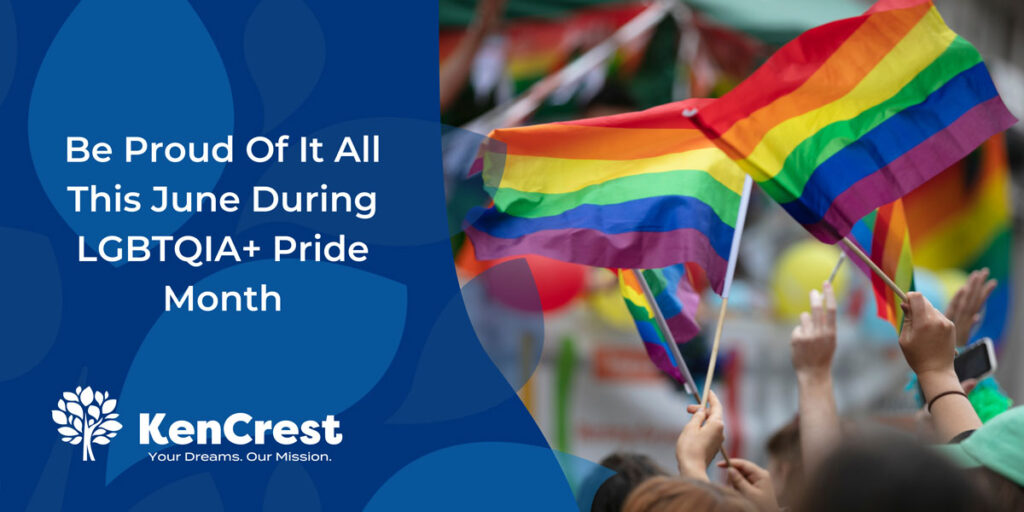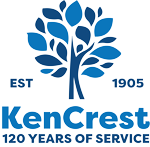Be Proud Of It All This June During LGBTQIA+ Pride Month

This June, celebrate LGBTQIA+ Pride Month by learning about the various identities that make every person unique.
By Dr. Autumn Dae Miller (she/her), who has so many identities
We all have multiple identities; however, some have been systemically marginalized and disenfranchised. These include races, ethnicities, classes, age groups, spiritualities, sexual orientations, gender identities, etc. Society sometimes assumes that one of our identities, typically the more recognizable, is somehow more important than the others. This is especially true in human service agencies.
A 2022 study by the Human Rights Campaign found that 36 percent of LGBTQIA+ individuals also identified as having a disability; this compares to 24 percent of those with disabilities who do not identify as LGBTQIA+. A 2021 study from Cambridge University confirmed that Autistic individuals are more likely to identify as LGBTQIA+ than non-Autistic individuals.
These research studies show that Autistic individuals are much more likely than non-Autistic folks to identify as transgender and/or non-binary. It shows a higher likelihood of LGBTQIA+ and Disability intersectional identities than more families and service agencies recognize. This is why it’s so essential for human service industries to take a stand and show support for LGBTQIA+ individuals.
What we know now as LGBTQIA+ Pride, began as the Stonewall riots on June 28, 1969 after police raided the Stonewall Inn bar in NYC. In 2000, President Bill Clinton officially named June “Gay and Lesbian Pride Month,” and a short nine years later, in 2009, President Barack Obama changed the month again to “Lesbian, Gay, Bisexual, and Transgender Pride Month.” Now in 2023, Pride Month continues to change to include the various identities people have, and thousands of cities across the country celebrate LGBTQIA+ pride month with festivals, parades, and more.
This year, Philadelphia held its annual LGBTQIA+ Pride March and Festival on June 4th, with a bit of a twist. For the first time, Disability Pride partnered with them and set up a two-stage decompression zone, offered resources to the community, and—for the first time at any LGBTQIA+ event this author has attended—provided adult changing stations!
Having a space for disabled individuals to access is huge in the human services industry, and it’s a positive step in the right direction of inclusivity. The festival even had a quiet area where people could sit and color with others in a much less overwhelming setting.
For those who have never participated in a Pride event, this may not seem like a necessary part of having a meaningful life. Pride is not just about covering oneself in glitter and dancing while wearing a flag as a cape. It is about finding safety, community connections, celebrating joy in one’s identity, and finding resources in one’s location. When these events are inaccessible or unwelcoming to folks with intersectional identities, it defeats the purpose of Pride.
Trigger warning: Many people are fighting a social genocide of multiple identities. Through anti-LGBTQIA+ legislation, removal of reproductive rights, and book bans eliminating Black, Indigenous, LGBTQIA+, Disabled, and more stories, the rights and histories of people who have been OTHERED in society are being systemically erased.
It isn’t easy to recognize who is missing from events or spaces of Pride, but change takes work, and here’s how to begin.
- When planning events, make sure the location and the set-up are safe and accessible for everyone. Think about transportation, getting inside the event, and navigating the spaces physically and energetically.
- Does the group planning the event have the same or similar identities? Remember, variety is the spice of life, and partnering with people different than us is critical to success.
- Get feedback from the community. If you plan something for a group of humans as an ally, always check in with self-advocates willing to help educate. Don’t assume that random people or even friends want to teach you how to be inclusive just because they have an identity you don’t!
The things that make us excellent are found at the points of intersection. We must take the time, energy, and effort to celebrate and welcome everyone within the community. Happy Pride!
